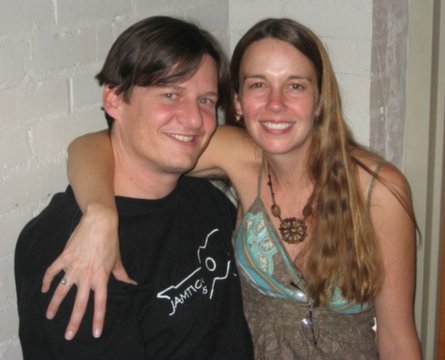
Occasionally the "encapuchados" (hooded people) even set up roadblocks on the highways to demand a talacha from passing motorists.
Other aspects of the strike include a parade called the Desfile de Bufos (roughly, Parade of Mockeries) which occurs near the end of Lent and includes floats, caricatures of political leaders, and various speakers airing their complaints on microphones with loud sound systems.

This "encapuchado" is carrying a mostly empty bottle of rum under his hat during the Desfile de Bufos on a recent Friday, April 7.

Here, "encapuchados" dance in the streets with some of the local hookers, while onlookers gather with apparently nothing better to do.

The Desfile even includes a cross-dresser...

...and a US flag with a big X on it. (At least they didn't burn it) Despite this presumably anti-US sentiment, Rob had no problem pushing past the on-lookers and joining the parade to get a close-up photo of the flag. Maybe they thought he was French or something.

Additionally, on numerous occasions throughout Lent, the student groups often set up a stage in the central park here in Xela to air their complaints, as well as generally make fools of themselves on stage with a microphone.
This whole Huelga de Dolores tradition dates back more than a hundred years, to the days of dictatorship in the late 1800s. The student "strike" became a safe means of speaking out against an authoritarian government without fear of reprisals.
In recent years, the most controversial part of the "strike" is undoubtedly the collection of "taxes" from businesses and merchants. The tax ranges anywhere from $200 to $2000, depending on the perceived wealth of the business owner. Throughout the years, the students have collected these "taxes" under the pretense that the government and business community are generally negligent – which is hard to deny – resulting in a shoddy, under-funded educational system and extremely high levels of poverty, gang violence, and general underdevelopment throughout the country. With this in mind, the “taxes” are supposedly destined toward charitable organizations and schools that specifically help poor people.
However, as the government has reformed to democratically elected civilian rule in the last decade, it is generally believed that these days a large percentage of these "taxes" end up funding parties and other rewards for the students who collect them. Furthermore, this whole venture ends up coming off like a mafia operation, because those businesses and merchants that don’t pay the "tax" often face reprisals. It is common for the "encapuchados" to return at night to businesses that don’t pay and vandalize them, covering the facades with paint and burnt motor oil.

This photo was recently printed on the front page of one of Guatemala's most widely read newspapers. The business which are being vandalized by the "encapuchados" with paint and burnt motor oil are only about a half a mile from our home here in Xela.

This was the site that awaited us a block from our house on Friday morning, April 7. A local appliance store was completely covered in burnt motor oil by "huelgero" vandals on the Thursday night 9 days before Easter, the traditional "Noche de las pintas" (night of the paintings).

This karate training center near our house apparently also refused to pay the tax.

We're pretty sure that if people tried this in the US, some "encapuchados" vandals would get their heads blown off by angry business owners with guns. Fortunately for the vandals, they have more than a hundred years of "tradition" backing them up.
Recently a local newspaper published an account of a man in his car who refused to pay the "tax" demanded by students at a roadblock in a city street. The man claimed the hooded students started smashing the windows and mirrors of his car with large wooden clubs. Of course a spokesman for the students claims the students did not demand a tax and that the reason for the attack was because the man in the car acted with hostility toward the students and ran over the foot of one of them.
Whatever the case, there is no doubt about the collection of these "taxes" and the reprisals of vandalism. Also not in doubt is the low regard with which many residents are starting to hold these groups of students and their taxation ritual, and the fact that the police do almost nothing to prevent any of it, vandalism included. Of course it would not surprise us in the least if the police are receiving a cut of the taxes collected by the students.
Return to main page
